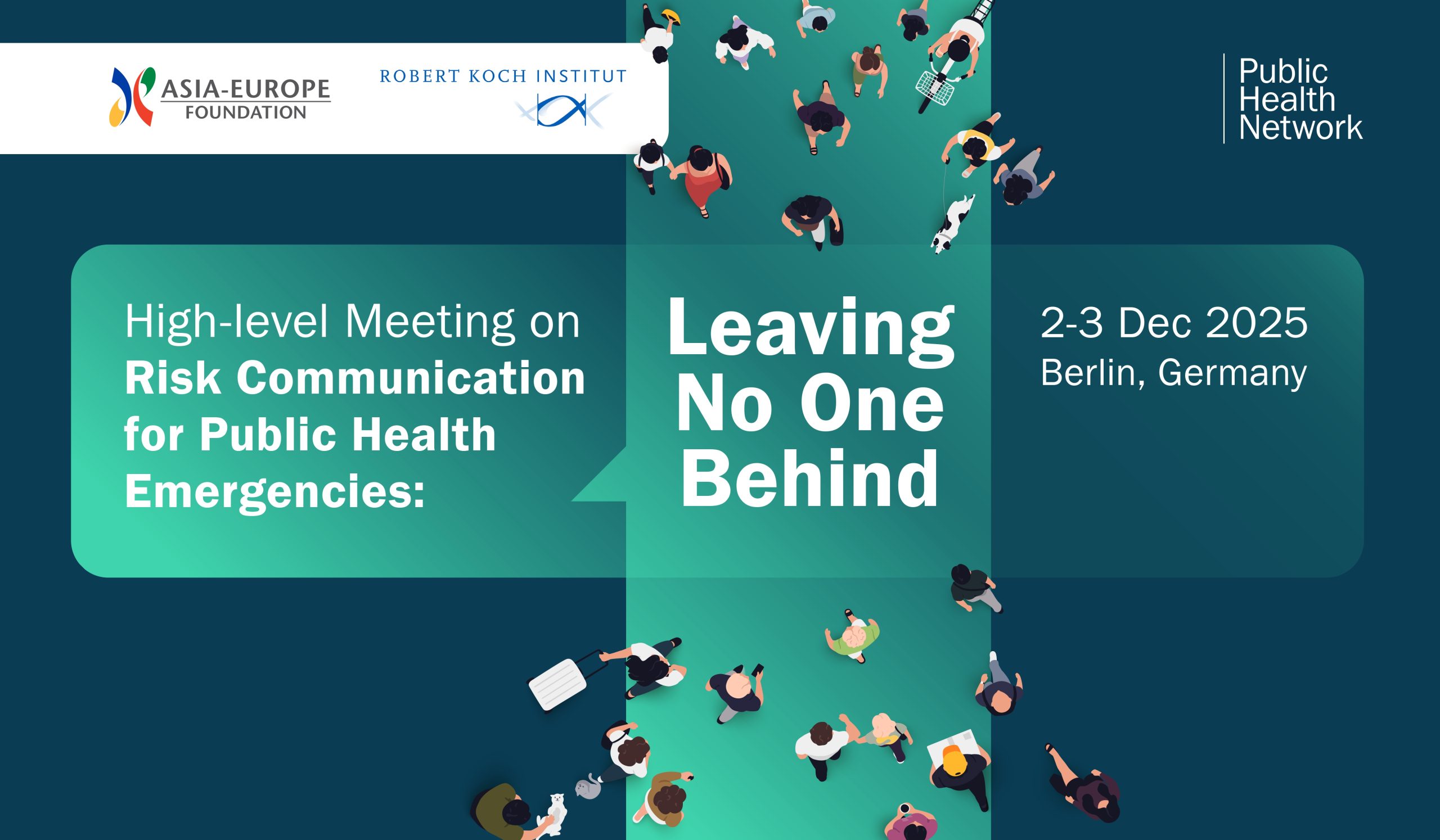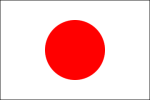Asia-Europe Foundation Public Health Network (ASEF PHN) & Robert Koch Institute (RKI)
JOINT EVENT
High-level Meeting on Risk Communication for Public Health Emergencies: Leaving No One Behind
2-3 Dec 2025, Berlin, Germany
Scope & Purpose
In an increasingly connected world, approximately 1 in 8 people globally are considered “migrants”, amounting to over 1 billion individuals. Ethnic minorities often experience health disparities and face unique health needs due to a combination of social, economic, and cultural factors. Addressing the health needs of these populations, which can differ from those of the host community, is essential for public health[1]. The latest Public Health Emergency of International Concern (PHEIC) caused by the novel coronavirus disease (COVID-19)[2] has posed significant challenges to the global community, particularly the public health sector. This pandemic affected every country, but not everyone experienced its impact in the same way; some groups were hit much harder than others, even within the same country. Socio-economic deprivation influenced health outcomes negatively, leaving certain populations more vulnerable than others. Barriers to accessing health services are more prevalent among minority groups, including migrants and displaced persons, which increases their vulnerability to health risks[3].
Effective risk communication and community engagement (RCCE) plays a crucial role in addressing these health disparities. However, it is a challenging task, as many ASEM Partners expressed their interest in discussing how to reach different population groups with diverse cultural practices, socio-economic resources and languages. The same message does not convey the same information if their cultural backgrounds, resources and language barriers are not considered. By taking these factors into account, we can foster more effective public health messaging and ultimately improve health outcomes for all.
In 2025, ASEF Public Health Network (ASEF PHN) and the Robert Koch Institute (RKI) will jointly organise a High-level Meeting on Risk Communication for Public Health Emergencies (PHEs): Leaving no one behind.
Objectives
The primary goal of this High-Level Meeting is to enhance countries’ capacities for effective Risk Communication during public health emergencies. The meeting will serve as a platform for bi-regional exchange of best practices and lessons learned from the COVID-19 pandemic and beyond, with a particular focus on effectively reaching migrants and ethnic minorities.
Specific objectives of the meeting are:
- To develop a set of recommendations for inclusive RCCE that address the needs of migrants and ethnic minorities during public health emergencies by sharing best practices and lessons learnt
- To discuss innovative approaches including but not limited to the use of AI, social media and other technologies to effectively engage migrants and ethnic minorities
- To discuss and experience different participatory engagement methods for health emergency preparedness and response activities
- To facilitate networking among the Risk Communication implementers across Asia and Europe; and
To determine the areas of international/inter-sectoral collaboration to enhance Risk Communication for the future public health emergencies
Target Audience
The High-level Meeting will target the following audiences: i) Government officials in charge of health emergency preparedness and response and RCCE; ii) Government officials from sectors outside of health who are involved in responding to public health emergencies; and iii) representatives from civil society, including Non-Governmental Organisations (NGOs), International Organisations (IOs), academia as well as the private sector.
More specifically, the meeting would aim to engage:
- Senior-level officials, advisors and/or other decision-makers from ASEM Partners’ Ministries of Health or equivalent
- Spokespersons/senior-level media personnel from ASEM Partners’ Ministries of Health or equivalent
- Senior-level officials, advisors and/or other decision-makers from ASEM Partners’ Ministries of Finance, Foreign Affairs, Tourism and other related Ministries
Representatives of NGOs, IOs, academics and companies whose work is related to RCCE, public health emergency preparedness and response and health needs of migrants and ethnic minorities
Expected Outcome
The High-level Meeting will foster the exchange of good practices and lessons identified during the COVID-19 pandemic and beyond, with a focus on establishing and improving Risk Communication processes in Asia and Europe as part of pandemic preparedness and response process. The outcomes of the meeting will be summarised in a short report that includes key recommendations.
About the joint high-level meeting
This event is via invitation only, and participants are required to register prior to the meeting.
Organizers
The Asia-Europe Foundation (ASEF) Public Health Network
The Asia-Europe Foundation (ASEF)[1], founded in 1997, is an intergovernmental not-for-profit organisation representing the 53 Asia-Europe Meeting (ASEM)[2] Partners: 30 European and 21 Asian countries, plus the European Union and the ASEAN Secretariat. Following the 6th ASEM Summit (ASEM6; 2006; Helsinki, Finland) where the leaders expressed their determination to combat avian influenza and a possible human influenza pandemic, the “ASEM Initiative for the Rapid Containment of Pandemic Influenza”, financially supported by the Government of Japan, was launched at the 9th ASEM Foreign Ministers’ Meeting (ASEM FMM9; 2009; Hanoi, Viet Nam). Since then, the two components of the Initiative, ASEM stockpile of anti-viral drugs and personal protective equipment, as well as ASEF Public Health Network (ASEF PHN) have contributed to strengthening ASEM Partners’ capacity for managing Public Health Emergencies (PHEs).
ASEF PHN & Risk Communication for PHEs
ASEF PHN’s scope is not limited to pandemic influenza – it expands to Emerging Infectious Diseases (EIDs) as well as Pandemic Preparedness and Response (PPR). ASEF PHN has been working on Risk Communication for PHEs – Prior to the pandemic, ASEF PHN implemented a series of High-level Meetings focusing on Risk Communication & Leadership (2017), How Can We Include Migrants & Ethnic Minorities (2018), and Risk Communication Beyond the Country Borders (2019) for effective Risk Communication during PHEs. In 2020, ASEF PHN conducted a research project “Monitoring and Evaluation for edidence-based Risk Communication during the COVID-19 pandemic”. During the pandemic, virtual conferences were implemented focusing on “Risk Communication during high uncertainty”, “Combatting infodemic & effective use of social media” & “Increasing vaccine confidence”sharing good practices and lessons learnt across Aisa and Europe during the COVID-19 pandemic, followed by the hybrid meeting “the Role of Risk Communication in Pandemics” in 2022, and “Risk Communication as part of the Whole of Government approach” in 2024
The Robert Koch Institute (RKI)
The Robert Koch Institute (RKI) is a public health institute in Germany and a central authority for disease control and prevention within the portfolio of the Federal Ministry of Health. Founded in 1891 by the microbiologist Robert Koch, the institute originally focused on infectious disease research and bacteriology. Today, it is responsible for monitoring health trends in both infectious and non-communicable diseases, disease outbreaks and prevention, conducting epidemiological research and methodology, evaluating health risks as well as advising political decision-makers to protect public health. The RKI has played a key role in managing major health crises such as the H1N1 influenza pandemic in 2009, the EHEC outbreak in Germany in 2011, and the COVID-19 pandemic, during which it became a primary source of guidance and information for both policymakers and the professional public.
RKI & Risk Communication
Communication plays a crucial role in the RKI’s responsibilities, ensuring that reliable and accurate and timely information reaches primarily the professional public and policymakers. This became especially visible during the COVID-19 pandemic, when the RKI regularly briefed the media, published detailed situation reports, and issued guidance mainly aimed at the professional public. Using multiple channels, including comprehensive and up-to-date information on the RKI website, press activities, social media, and official publications, RKI aims to counter misinformation, and fosters public trust. Its communication strategy follows international best practices, emphasizing transparency, reliability, empathy, and engagement with stakeholders. As part of its global approach, the RKI collaborates closely with international partners such as the World Health Organization (WHO), the European Centre for Disease Prevention and Control (ECDC), and public health institutes in other countries (IANPHI) e.g. to share data and contribute to joint risk assessments. These partnerships help ensure a broader approach and strengthen Germany’s role in global health security
ASEF’s contribution is made possible with the financial support from the Government of Japan.


